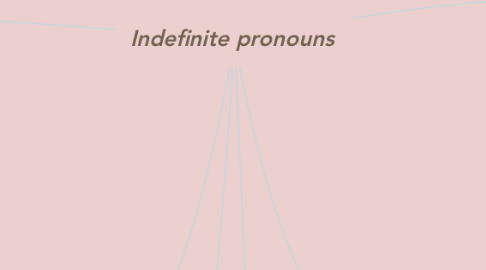Indefinite pronouns
da Daniela Bercian


1. 1. Indefinite pronouns in singular always carry the verb in the singular.
2. Part (positive)
2.1. Person= Someone, somebody.
2.2. Places= Somewhere
2.3. Things= Something
2.4. For example She saw somebody in your house,There is someone in the room, You said something about my new car, She went out somewhere.
3. All
3.1. Person= Everybody, everyone
3.2. Places=Everywhere.
3.3. Things= Everything
3.4. For example His name was Henry but everyone called him Harry. All your clothes are clean. I washed everything yesterday. The sand got everywhere, into eyes, hair, tents, cups of tea, camera lenses.
4. GRAMATICAL RULES
4.1. 2. The uses of indefinite pronouns composed with "some", "any", and "no" in affirmative, negative and interrogative phrases are the same as the uses of "some" and "any". "Some" and its compounds are used with affirmative and interrogative phrases; "Any" and its compounds are used with negative and interrogative phrases; and "no" and its compounds are used only with negative phrases .
4.2. 3. When we refer to an undefined pronoun, we usually use a plural pronoun
4.3. 4. We can use the Saxon genitive ("-'s") with undefined pronouns of people and things to indicate possession..
5. Part (negative)
5.1. Person= Anybody, Anything
5.2. Places= Anywhere.
5.3. Things= Anything
5.4. For example She will not bring anybody with her, Is there anybody in the room? There isn’t anyone in the room, He didn’t lose his wallet anywhere.
6. None
6.1. Person= No one, nobody
6.2. Places= Nowhere
6.3. Thing= Nothing
6.3.1. For example Nobody ever goes to see her. She’s very lonely. You usually have to wait for a long time. Nothing happens quickly. There was nowhere to park the car.
